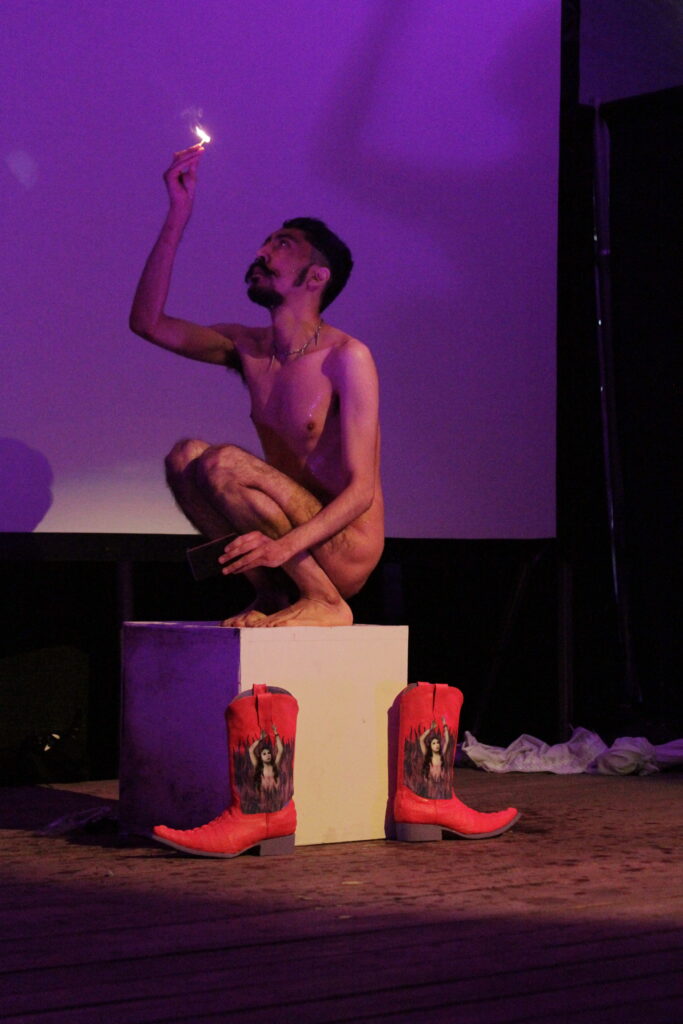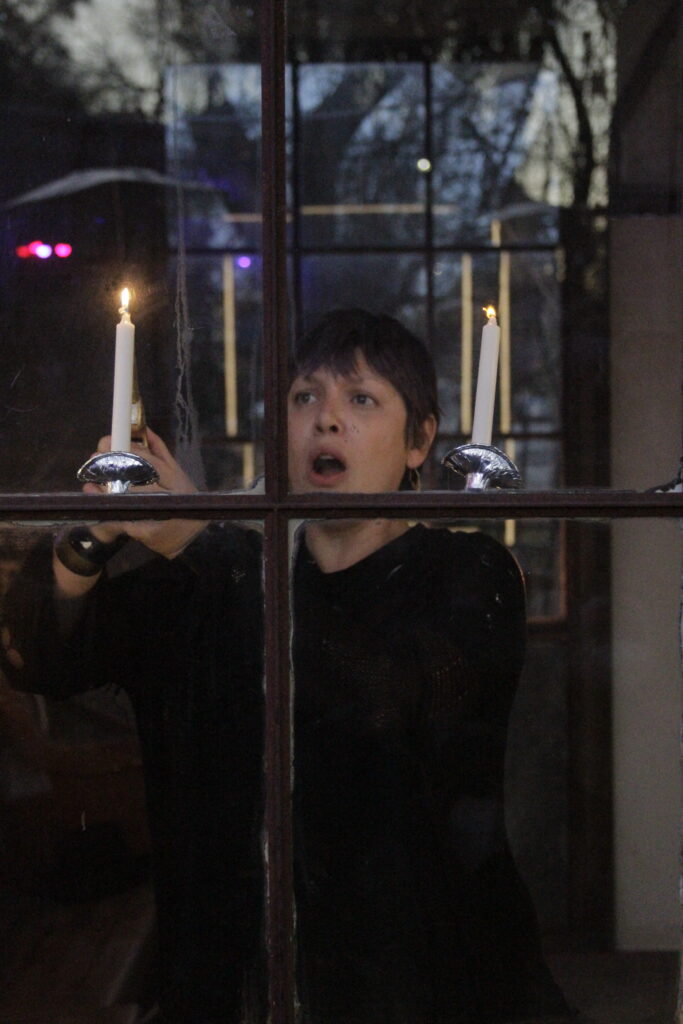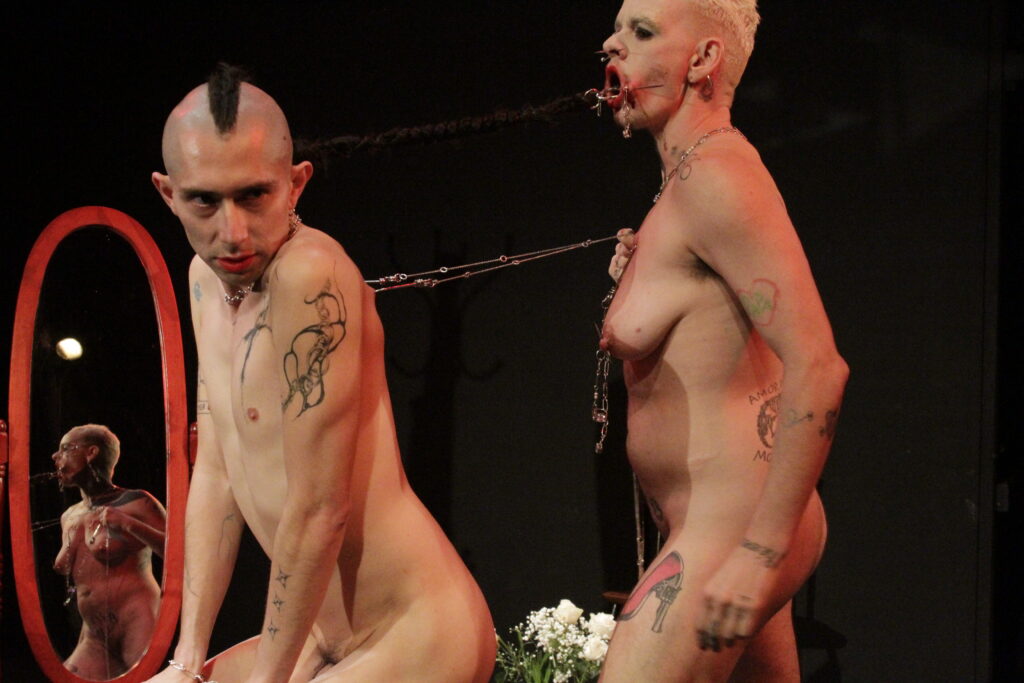by César Ivan Alvarez-Ibarra
For the last eight years, the City of Austin has hosted OUTsider Fest. Outsider is an opportunity for regional and international performance artists to gather in a single space and share with different communities their work, hold a conversation, and for a moment, a brief moment, it permits us weirdos, faggots, and other urban creatures to enjoy a temporal/spatial break from the Lone Star State. In 2022, the festival ran from February 16-22. Here I write about day four of the fest, Saturday the 19th, and the performances of Carmina Escobar, Lechedevirgen Trimegisto, Maria Perkances, and Manu Huesca.
After a margarita and some friendly greetings upon arriving to the Vortex Theater on Manor Road, the festival’s annual venue, I went to line up for Lechedevirgen Trimegisto’s performance Infierno Varieté. I’ve enjoyed this artist’s work before, so being able to see Lechedevirgen perform again felt personal; a one-on-one conversation with them. I was seated close to the stage, which was illuminated with a combination of red, violet, and Mexican-pink lights. On a screen, some images were displayed, accompanied by musical arrangements that were familiar to those growing up in a Mexican household. I felt the rhythm, I listened to the lyrics; I grew expectations. Enter stage left, Lechedevirgen.

Wearing a Mexican maricón norteño-royalty inspired outfit, Lechedevirgen stole our absolute attention. They judged us and found us guilty. Lechedevirgen returned to their magisterial text Pensamiento Puñal as means to critique the cis-heterocentric normative (cis)tem corroding the lives and spirits of queer/cuir people. They denounced the poison and violence that the expectations of macho masculinity represent for those that embody sexual and gender dissidence. In their discourse “dissidence” became a central word; Lechedevirgen reminded us that the violence of (cis)tem can be, and has been, reproduced by white queer/cuir people allied to politics of respectability and the domination of capital.
All of us listened with attention, some of us manifested our agreement; from others nothing but silence. Lechedevirgen proceeded by emulating a satanic snake; their clothes started coming off, and they informed us that there were several surprises under the seats of three lucky spectators. Lechedevirgen requested the lucky spectators to bring their prizes up to the stage. Three red gasoline canisters were placed in front of Lechedevirgen. One of them supposedly contained the sacred liquid of (neo)liberalism. Lechedevirgen poured them, one by one, over their body, testing with a lit match whether this performance was going to be one where another show will be offered to the audience. Alas, none of the canisters lit up, only my nerves.
Lechedevirgen brought into their queer/cuir denunciation a partner, a black robe which covered half of their body, topped by the goat head of Baphomet which now rested on the performer’s shoulder. With the new partner, Lechedevirgen danced and shared an erotic process of seduction, fear, and demonic connection. In their performance, Lechedevirgen materialized dreams of alterity where the monsters, perverts, deviants, and faggots could exist and celebrate beyond respectability, beyond LGBTQ integration. For the final act of their performance, Lechedevirgen brought to the stage two new partners, two new monsters that accompanied them in their ritualistic dance. Outside the tent the sun slowly calmed; Lechedevirgen concluded the action with a brief session of can-can music and dance. We clapped following the rhythm of the music, we clapped following the kicking legs of the performers, pointing toward queer/cuir futuristic possibilities.

Next, I was seated on the floor waiting for Carmina Escobar’s second act of Escupefuego /Spitfire. Escobar’s presentation transformed the Pony Shed, at the Vortex, into a shrine dedicated to light, life, and the cosmos. Each small window at the Pony Shed held a thin white candle that when illuminated, gifted us a hypnotic game of reflections. In the center of the shed, Escobar arranged the equipment ready to assist her in transmitting her voice across the spaces surrounding us.
Escobar modulated her voice, which navigated beyond the bodies of those of us listening; it touched affective filaments connecting the past-present-future of her audience. The vibrations came from the wind; they came also from the floor as if Escobar was singing from the center of the earth. Her body moved with her voice, freely, approaching us and, with her eyes, inviting us to join. Those brave and lucky enough to interact with Escobar were instructed to paint over her, creating another layer of the performance she was already embodying. I dried my tears, which wouldn’t be the last ones I let escape that day, and thanked Escobar for what she had done, for letting me feel again the desert and the memories kept there.
The final performance of the night was Venus en Joyxs 3- “teratogenic Jewels” by the duo of María Perkances and Manu Huesca. On the illuminated stage rested a black chair, a red mirror, a metal table with jewels, surgical instruments, and white roses. Perkances appeared wearing a black cocktail dress, behind him came Manu dressed as a butler holding a metal tray in which more jewelry was presented to the audience. As they proceeded to enact the scenario, an erotic tension emerged between them. Their eyes and hands explored each other, Manu’s hands drew invisible symbols on Perkances’s back, and Perkances explored Manu’s thighs and ass, squishing them from time to time. The audience went wild. As a Hanna-Barbera suit-wearing wolf, I howled.

The music, which was mainly composed of heavy metal rock and technoindustrial arrangements, increased its speed; Perkances and Manu fed us pure and organic expectation. They showed us their instruments: hooks, long needles, latex gloves, and antiseptic materials. My heart sped up, my stomach got tighter and tighter, and my hands were ready to cover both eyes, yet I had to endure, I wanted to see it all. The first perforation was on Perkances, a futuristic decoration on his right temple. Then Manu had both shoulder blades pierced by two hooks. The action was repeated on Perkances’s breasts. Perkances’s mouth was the last place pierced; a beautiful long metallic needle rested over his tongue while it punctured both cheeks.
Perkances held Manu’s single braided hair and took it to his mouth. With a small hook tied to the braid, Manu was connected to the needle that pierced Perkances’s mouth. Perkances proceed to hold an exquisite chain that linked with the hooks on Manu’s back as if they were guiding a horse. The performers couldn’t move alone anymore; they had become one, a single erotic monster. Prophet of pain, prophet of excess. The creature escaped the theater looking for people to convert to a cursed religion that spoke of what is to come. My stomach knew it, my intestines felt it; I saw the future, I saw a queer god to whose vulgar kin I belonged. My eyes filled up with tears, and my heart wanted to leave my body. I stood up and clapped as if I was willing to sacrifice my hands to them.

César Ivan Alvarez-Ibarra was born and raised in Monterrey, México. He is a Ph.D. student at LLILAS, and his research focuses on the artistic possibilities of cuir visicerality as a performance tool. He’s also interested in topics such as monstrosity, disgust, temporal alterities, and hegemonic respectability.
